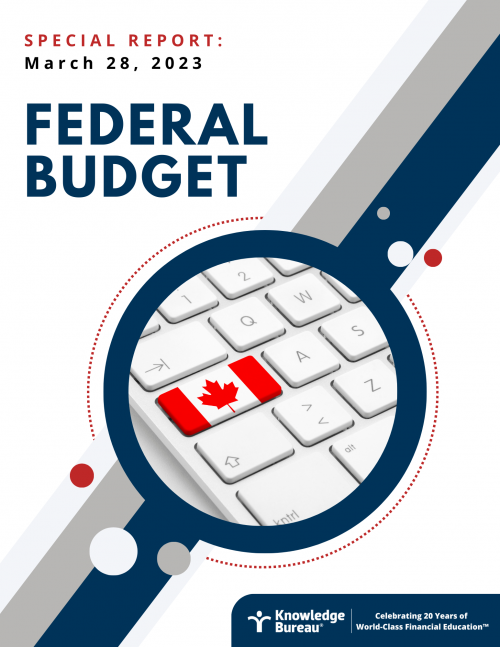Weigh In: Federal Budget Consultations

Evelyn Jacks
The Finance Department is asking for your input - now until March 10 - for its anticipated Budget 2025. This is especially interesting, given the upheaval in Canadian and international politics, and recent retreats in taxation policy: the reluctant postponement of the proposed capital gains inclusion rates, bare trust reporting and the introduction of the Underused Housing Tax.
Here’s what we found out about the consultation process, why you should consider participating, and how this year’s most important Budget could immediately help increase living standards against real economic threats.
The Budget Goals. The invitation to consult on the next federal budget includes a preamble about the current government’s goals, even though it remains prorogued, with an imminent election in the offing. It states:
“. . . the government will remain focused on responding to the current Canada-U.S. context, making life more affordable for all Canadians, continuing to strengthen economic security, and unlocking growth by boosting our competitiveness and productivity.”
This survey says a lot about what the government is thinking about already on how it will spend your taxpayer dollars. Does it represent your priorities?
How to Participate. You can sound off at Canada.ca/your-budget.
About the Questions You’ll Answer. All questions require an answer except question 5, 8,9 and 10:
1. How do you think the government can best support Canada’s future economy? ( You are asked to select 1 of 12 options, which include questions about housing, training, Canadian business investment specific to investments in clean energy, technology and” stimulation of competition” through innovation and lower prices, the deficit, red tape, interprovincial trade and foreign investment. None of the questions address the tax system specifically. If you select “Other, there is no option to explain the economic issue that is important to you.
2. What are the most important ways the Government of Canada can help ensure that no Canadian gets left behind? (Select up to 3 – again the options are specific to supporting housing, low income supports, homelessness, medications, mental health services, reconciliation). Aside from the supports for medications, there is no mention of supporting the aged, an increasing issue of importance given the aging demographic changes in Canada.
3. Which of the following is the biggest financial concern for you or your family? There are 18 options the government has pre-programmed and you can select up to 3. Taxation isn’t one of them although there is an “other” option, which you can embellish on.
4. What do you think is the most important issue for Canada to address in its relations with the U.S.?
5. If the U.S. imposes or has imposed tariffs on Canadian goods, what do you think the impact would be on Canada’s economy?
6. What province or territory do you live in?
7. Which of the following age groups do you fall into?
8. How do you identify yourself? (gender – there are 5 options)
9. Do you identify as any of the following? (there are 9 options including Indigenous, veteran, person with a disability, 2SLGBTQI+ person, new immigrant, official language minority, etc.)
10. In what capacity are you completing this survey? (You are asked to select 1 of 5 including individual, business owner, non-profit)
11. Which of the following categories best describes your total household income? That is, the total income of all persons in your household combined, before taxes? You can choose an option not to say if you prefer.
How to Increase Cash Flow for All Canadians. Our unprecedented $1.4 Trillion debt, continued deficit spending and high costs of interest on debt payment arrived in the last budget as a big concern. Now there are many more unprecedented issues facing Canada and this budget is critically important to meet them. It must anticipate how economic threats will impact our society; unemployment or business failure in particular. It’s not “business as usual” and some of the supports from government need to be channelled towards economic well being over the long term and tax reforms in particular.
There is much talk about a basic living wage for Canadians – the amount of money needed to pay for basic necessities in turbulent times. An easy way to put money directly into the pockets of all Canadians at a low administrative cost is to raise the tax free zone – the Basic Personal Amount - to the basic living wage.
That’s the gap between the minimum wage and the amount people need to pay for the basic necessities of life and it ranges between $15.69 an hour in Brandon, Manitoba ($33,000 per year) to close to $26.00 in Vancouver ($54,000 annual). On average that’s about $43,500 per household per year.
A basic personal amount of about $22,000 per taxpayer would do it. Perhaps it’s time for the government to participate more directly in this quest.